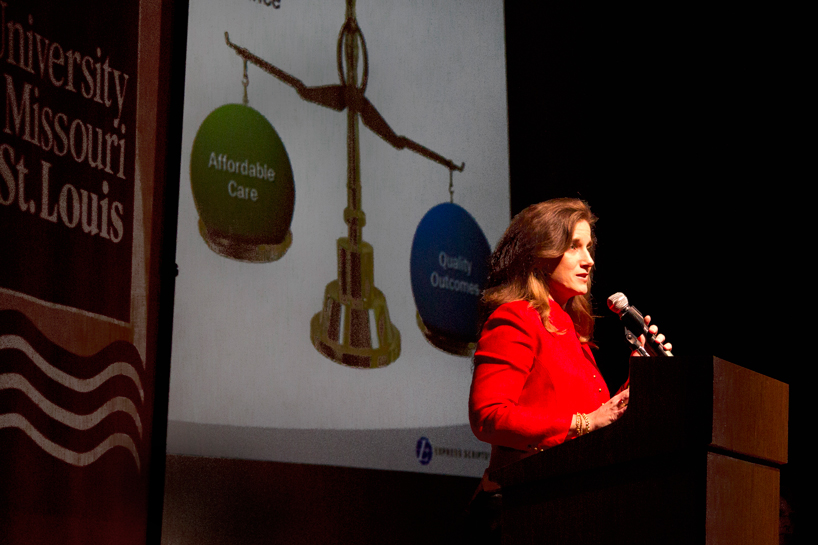
Dr. Lynne Nowak, medical director at Express Scripts Inc., spoke about the Affordable Care Act March 12 at the University of Missouri–St. Louis. (Photo by August Jennewein)
The Affordable Care Act has sparked hundreds of discussions, debates, news articles and criticisms since the 22,000-plus pages of legislation was passed into law in 2010. But what are the facts, and who does it affect?
Dr. Lynne Nowak, medical director at Express Scripts Inc., broke down the complicated act during the Hellen and Will Carpenter Series on Contemporary Issues in American Society March 12 at the University of Missouri–St. Louis.
“The goals of the Affordable Care Act are fairly simple and the intentions of this law are very, very good and are pretty hard to argue with,” said Nowak, who served as the speaker and panel moderator for the UMSL series. “It’s to expand access, increase consumer protections, emphasize prevention and wellness, improve quality and system performance, expand the health work force and curve the rising health-care cost.
“All of this is a balancing act because they all are wonderful things, but they all cost money.”
The ACA, which is sometimes referred to as “Obamacare,” is mandated health-care coverage that has implications for all Americans.
“Who does this affect? Really it affects everyone,” she said. “There isn’t one person who in some shape or form will not be affected by the act. Obviously it affects patients and doctors, but it also significantly affects employers and everybody in the middle. It really touches everyone in our country.”
Nowak said opinions on the act vary vastly and whether a proponent of it or not, it’s making an impact.
“It’s here and it has absolutely transformed health care in America,” she said.
The series is sponsored by the College of Arts and Sciences at UMSL.
Susan Kendig, teaching professor of nursing at UMSL, Shirley Porterfield, associate professor of social work and economics at UMSL, Andrew Kaiser, attorney at The Kaiser Law Firm in Des Peres, Mo., and M. Ryan Barker, vice president of health policy at Missouri Foundation for Health in St. Louis, spoke and addressed questions during the series.
“What it (the ACA) really boils down to is about 25 percent of it is increasing access to care, 50 percent is looking at improving quality and safety and the rest of it is how are we going to pay for all of this?” Kendig said. “So what’s good about this is there is an emphasis on patient protections and sometimes we forget that.”
Media Coverage:
The St. Louis American














